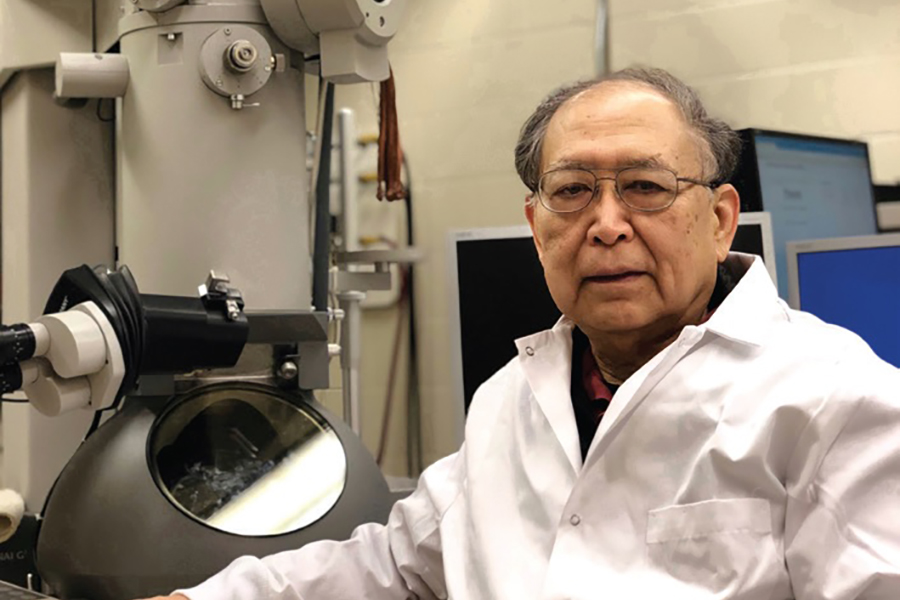Retirement: Celebrating Professor Richard Liu's Contributions
A graduate of National Cheng Kung University, Liu earned his master’s degree at the University of Cincinnati and doctorate at Purdue. After starting his academic career at Stanford, he joined Purdue’s faculty in 1978, where he served as a full professor since 1985. After serving Purdue for over 40 years, this thought leader and inspiring educator is retiring this summer.
Liu’s research career has been impressive. He received the prestigious William T. Ennor Manufacturing Technology Award from the American Society of Mechanical Engineers in 2008. One of the highest awards in the field, it salutes the intellectual, economic and social contributions of Liu’s work. Other notable awards include the 2011 SME/NAMRI Wu Research Implementation Award, the 1985 IR100 Award for teamwork at NIST and the 1984 ASME Blackall Award.
As a researcher, many contributions were in hard turning and nanomanufacturing. He developed an innovative process for making bearings with superior fatigue life that was applied by several major US suppliers and users. For a few steps away from academia, Liu served as a research engineer in industry, developing a dominant product, and as a VP of Industrial Technology Research Institute of Taiwan, where he strengthened several product and process-based industries.
In last ten years of his career, he has worked in an emerging areas of additive manufacturing and nanomanufacturing. The first work is for predicting the micro-structures in components made by energy beam additive manufacturing. This work has contributed to the fundamental understanding of the microstructures and performance of materials produced digitally under rapid re-heating and re-cooling conditions. The second work is a method of controlled selective growth of nanomaterials by pulsed-laser activated chemical synthesis. This work has advanced non-classic theory of crystallization.
He has published over 180 peer reviewed research papers, holds three patents and taught courses on Design, Manufacturing and Competitive Strategies for Products and Processes.
Dr. Liu states, “In addition to providing engineering students with the scientific knowledge in their areas of specialization, it is desirable to teach them leadership, innovation and group problem solving methods so they can become more effective in handling engineering synthesis.”
To achieve this purpose, Dr. Liu developed and applied a then-new approach to teaching engineering problem solving in IE 470, an undergraduate manufacturing course. He was a Purdue pioneer in his approach to teaching engineering courses by using project-driven team learning. He also has developed and taught IE590- Structured Engineering Innovation, a dual-level pioneering course teaching “deliberate innovation”.
While serving as IE Associate Head-Graduate Program he developed the MSIE Fast-track Double Degree 3/1/1 Program. This program was for outstanding juniors to apply for admission to take four distance graduate courses in their senior year and complete their studies on-campus in the 5th year. This approach received accolades by the University Decadal Committee and in 2011 was adopted as one of several strategies for university development. The hybrid mixture of distance and on-camps courses has attracted attention in dedensification of classrooms for social distancing in the pandemic.
His service to Purdue goes beyond his professional duties. One of Richard’s favorite memories at Purdue was his philanthropic work helping establish the Moshe M. Barash Distinguished Lectureship, in honor of his mentor. The series is now an anticipated annual event.
Dr. Liu has persistently pursued innovation and excellence in both the classroom and in his research program, applying his Industrial Engineering strengths along with his enthusiasm for students.
Abhi Deshmukh, the James J. Solberg Head and Tompkins Chair of Systems, School of Industrial Engineering, says, “The legacy and impact of Prof. Liu’s work will live on through his students and the adoption of his research. We wish him the best in his retirement.”

